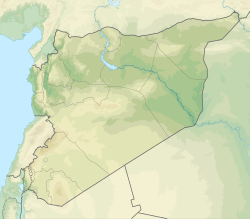Tell Sheikh Hamad
 Ruins of the "Red House" of Tell Sheikh Hamad exposed by excavations (6th century AD) | |
| Location | Syria |
|---|---|
| Region | Al-Hasakah Governorate |
| Coordinates | 35°38′36″N 40°44′25″E / 35.64333°N 40.74028°E |
Tell Sheikh Hamad (Template:Lang-ar), also Dur-Katlimmu, is an archeological site in eastern Syria on the lower Khabur River,[1] a tributary of the Euphrates.
Chalcolithic occupation

The site of Tell Sheikh Hamad was occupied from the Late Chalcolithic period (Late Neolithic, M4), when it was a small settlement.[2]
Assyrian city of Dur-Katlimmu
In the 10th to 7th centuries BC, it was the site of the Assyrian city of Dur-Katlimmu, which may have been founded during the reign of Shalmaneser I. The name Dur-Katlimmu may refer to the limmu (an appointed royal official) Ina-Aššur-šuma-asbat son of Aššur-nadin-šume.
During the fall of the Assyrian Empire (911-605 BC), sections of the Assyrian army retreated to the western corner of Assyria after the fall of Nineveh, Harran and Carchemish, and a number of Assyrian imperial records survive between 604 BC and 599 BC in and around Dur-Katlimmu, and so it is possible that remnants of the Assyrian administration and army still continued to hold out in the region for a few years.[3]
After the fall of the Assyrian Empire, Dur-Katlimmu became one of the many Near- and Middle-Eastern cities called Magdalu/Magdala/Migdal/Makdala/Majdal, all of which are simply Semitic language toponyms meaning "fortified elevation, tower".[1][4]
Excavations
The site was excavated between 1978 and 1988.[5]
Excavations have recovered 550 cuneiform Akkadian and 40 Aramaic texts belonging to a senior guard of Ashurbanipal.
In July 2020, French archaeologists excavated Tell Sheikh Hamad during the Syrian Civil War, according to the Anadolu Agency.[6]
References
- ^ a b Kühne, Hartmut, ed. (2005), Magdalu/Magdala: Tall Seh Hamad von der postassyrischen Zeit bis zur römischen Kaiserzeit, Volume 1, Berichte der Ausgrabung Tall Seh Hamad/Dur-Katlimmu, Berlin: Harrassowitz.
- ^ Bryce, Trevor; Birkett-Rees, Jessie (2016). Atlas of the Ancient Near East: From Prehistoric Times to the Roman Imperial Period. Routledge. p. 99. ISBN 9781317562108.
- ^ Parpola, S.; Whiting, R.M., eds. (1997), Assyria, 1995, (Symposium Proceedings), Helsinki: Neo-Assyrian Text Corpus Project.
- ^ cf. Hoffmeier, James Karl; Millard, Alan Ralph, eds. (2004), The Future of Biblical Archaeology: Reassessing Methodologies and Assumptions, (Symposium Proceedings), Grand Rapids: Eerdmanns, p. 105.
- ^ Kühne, Hartmut, ed., "The Citadel of Dur-Katlimmu in Middle and Neo-Assyrian Times" (3 Volumes: Harassowitz Verlag, Berichte der Ausgrabung Tall Šēḫ Ḥamad / Dūr-Katlimmu vol. XII, 2021). ISBN: 978-3-447-06168-1
- ^ "French archaeologists conduct excavations in Syria". Anadolu Agency. 15 July 2020.


